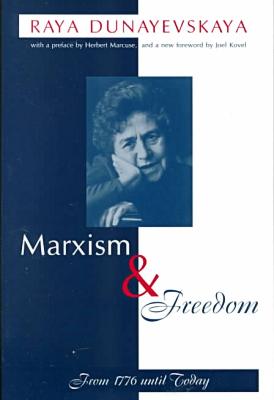MHI is starting the year with a contribution toward continuing Raya Dunayevskaya’s Marxist-Humanism by organizing a reading group on her first book, Marxism and Freedom, from 1776 until Today (1958). We will discuss it via telephone conference call, so anyone who wants to can participate for the price of the book and the phone call.
Beginning Monday Feb. 17 at 8:00 p.m. EST, we’ll have 10 weekly sessions of no more than two hours, covering about 30 pages in each. Please write to us at mhi@marxisthumanistinitiative.org if you want to take part so we can keep you informed of the plans and give you the phone number to use (not MHI’s phone).
People who are outside the U.S. should consult us about possible forms of teleconferencing that would enable them to participate.
MHI is sponsoring this reading group because we consider the issues taken up in Marxism and Freedom to be just as crucial for revolutionary theory and movements today as they were in the 20th century. In this work and throughout her life, Dunayevskaya aimed to recover the original Marxism of Marx—“thoroughgoing naturalism or humanism”—against a “veritable conspiracy” by the U.S. and Soviet Union that sought to tether Marx to a new system of unfreedom. Today, most of the left has still not come to grips with state capitalism’s world-wide domination and instead clings to the notion that the Soviet Union was, or China is, some form of socialism or workers’ state. The resultant loss of Marx’s perspective for the future means that we must settle for some kind of statism, whether Stalinism or social democracy, instead of working for total change. Dunayevskaya’s book, rooted in her grasp of history and of Marx’s analysis of capital, points to another direction: to breaking with the law of value and starting entirely new ways of work and life.
Marxism and Freedom, from 1776 until Today (first edition: New York: Bookman Assoc.1958; latest edition: Amherst, NY: Humanity Books 2000), is a foundational work of Dunayevskaya’s Marxist-Humanism. She developed that philosophy from the 1940s until her death in 1987. In this first book, she relates the 18th-19th century industrial, social-political and intellectual revolutions to the development of revolutionary thought; presents Marx’s 1844 humanist essays (the first edition included the first English translations); four chapters contain her seminal interpretations of aspects of Marx’s Capital; gives her analysis of the Russian Revolution’s transformation into the Soviet Union’s state-capitalism; and ends with chapters on automation and Maoism (the last added in 1964). It includes the first edition’s introduction by Herbert Marcuse and introductions by the author.
The book can be purchased through various internet outlets. MHI is currently out of stock. [Added Feb. 4, 2014]



Be the first to comment